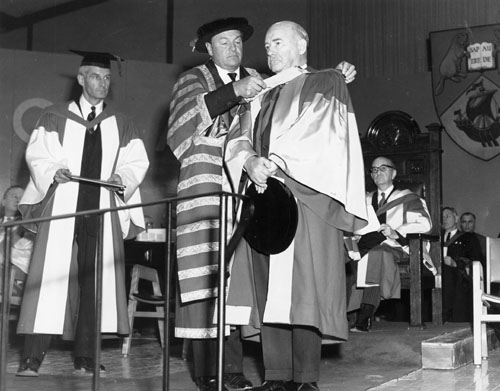1967 Fredericton Encaenia
Stacey, Charles Perry
Doctor of Letters (D.Litt.)
Orator: Cattley, Robert E.D.
Image Caption
L to R: Colin B. Mackay, Sir Max Aitken, Charles Perry Stacey
Second Image Caption
Source: UA PC-4 no.14j; Photo by Harvey Studios
Citation:
ENCAENIA, MAY, 1967
CHARLES PERRY STACEY
to be Doctor of Letters
"With reference to the narrative of events, far from permitting myself to derive it from the first source that came to hand, I did not even trust my own impressions, but it rests partly on what I myself saw, partly on what others saw for me, the accuracy of the report being always tried by the most severe and detailed tests possible. My conclusions have cost me some labour . . ."
Colonel Stacey is Canada's leading military historian. Many in this audience, especially the veterans, will vow that they recognize the quoted passage. If they hunt through the works on World War II that have made him and his school of historians famous, they will not find the actual words -- these were penned two thousand four hundred years ago by Thucydides -- but they will be right about the Stacey spirit. It is that Spirit of impartial and painstaking accuracy which inspires the writing of all first-class history, but particularly of military history, for -- and these are our militant scholar's own words -- "when to the grey fog of war is added the golden haze of romance, visibility tends to fall close to zero."
Professional soldiers both, the Thucydides of Athens and the Thucydides of Canada wrote on the greatest war within their respective purviews. Each, eschewing the romantic, has produced that greatest of all romances, a supreme national struggle recorded straitly and without bias. Each might have used the other's phrases, each pricked "the bubble, Reputation" (for Thucydides deflated his Wolfes and Montcalms), and each rose to the crowning moments, be it Pylos and Syracuse or Hong Kong and Dieppe. But whereas the Athenian was describing the downfall of his homeland, Stacey has described the rising glory of his.
When time permits the final assessment of Stacey's Six Years of War, as it has already assessed The Canadian Army 1939-1945, it will surely allow him the justified boast of his great predecessor: "My history has been composed to be an everlasting possession, not the show-piece of an hour."
From:
Cattley, Robert E.D. Honoris causa: the effervescences of a university orator. Fredericton: UNB Associated Alumnae, 1968.
CHARLES PERRY STACEY
to be Doctor of Letters
"With reference to the narrative of events, far from permitting myself to derive it from the first source that came to hand, I did not even trust my own impressions, but it rests partly on what I myself saw, partly on what others saw for me, the accuracy of the report being always tried by the most severe and detailed tests possible. My conclusions have cost me some labour . . ."
Colonel Stacey is Canada's leading military historian. Many in this audience, especially the veterans, will vow that they recognize the quoted passage. If they hunt through the works on World War II that have made him and his school of historians famous, they will not find the actual words -- these were penned two thousand four hundred years ago by Thucydides -- but they will be right about the Stacey spirit. It is that Spirit of impartial and painstaking accuracy which inspires the writing of all first-class history, but particularly of military history, for -- and these are our militant scholar's own words -- "when to the grey fog of war is added the golden haze of romance, visibility tends to fall close to zero."
Professional soldiers both, the Thucydides of Athens and the Thucydides of Canada wrote on the greatest war within their respective purviews. Each, eschewing the romantic, has produced that greatest of all romances, a supreme national struggle recorded straitly and without bias. Each might have used the other's phrases, each pricked "the bubble, Reputation" (for Thucydides deflated his Wolfes and Montcalms), and each rose to the crowning moments, be it Pylos and Syracuse or Hong Kong and Dieppe. But whereas the Athenian was describing the downfall of his homeland, Stacey has described the rising glory of his.
When time permits the final assessment of Stacey's Six Years of War, as it has already assessed The Canadian Army 1939-1945, it will surely allow him the justified boast of his great predecessor: "My history has been composed to be an everlasting possession, not the show-piece of an hour."
From:
Cattley, Robert E.D. Honoris causa: the effervescences of a university orator. Fredericton: UNB Associated Alumnae, 1968.
Citations may be reproduced for research purposes only. Publication in whole or in part requires written permission from the author.
